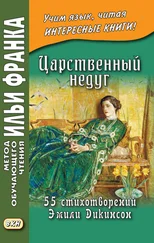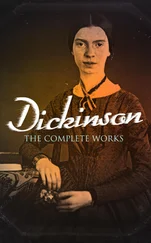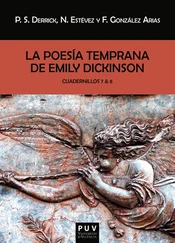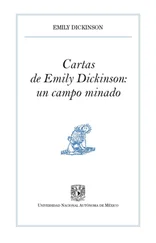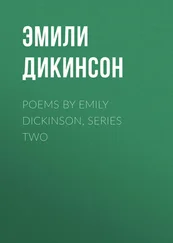XXII
A DAY
I'll tell you how the sun rose, —
A ribbon at a time.
The steeples swam in amethyst,
The news like squirrels ran.
The hills untied their bonnets,
The bobolinks begun.
Then I said softly to myself,
"That must have been the sun!"
* * *
But how he set, I know not.
There seemed a purple stile
Which little yellow boys and girls
Were climbing all the while
Till when they reached the other side,
A dominie in gray
Put gently up the evening bars,
And led the flock away.
XXIII
The butterfly's assumption-gown,
In chrysoprase apartments hung,
This afternoon put on.
How condescending to descend,
And be of buttercups the friend
In a New England town!
XXIV
THE WIND
Of all the sounds despatched abroad,
There's not a charge to me
Like that old measure in the boughs,
That phraseless melody
The wind does, working like a hand
Whose fingers brush the sky,
Then quiver down, with tufts of tune
Permitted gods and me.
When winds go round and round in bands,
And thrum upon the door,
And birds take places overhead,
To bear them orchestra,
I crave him grace, of summer boughs,
If such an outcast be,
He never heard that fleshless chant
Rise solemn in the tree,
As if some caravan of sound
On deserts, in the sky,
Had broken rank,
Then knit, and passed
In seamless company.
XXV
DEATH AND LIFE
Apparently with no surprise
To any happy flower,
The frost beheads it at its play
In accidental power.
The blond assassin passes on,
The sun proceeds unmoved
To measure off another day
For an approving God.
XXVI
'T was later when the summer went
Than when the cricket came,
And yet we knew that gentle clock
Meant nought but going home.
'T was sooner when the cricket went
Than when the winter came,
Yet that pathetic pendulum
Keeps esoteric time.
XXVII
INDIAN SUMMER
These are the days when birds come back,
A very few, a bird or two,
To take a backward look.
These are the days when skies put on
The old, old sophistries of June, —
A blue and gold mistake.
Oh, fraud that cannot cheat the bee,
Almost thy plausibility
Induces my belief,
Till ranks of seeds their witness bear,
And softly through the altered air
Hurries a timid leaf!
Oh, sacrament of summer days,
Oh, last communion in the haze,
Permit a child to join,
Thy sacred emblems to partake,
Thy consecrated bread to break,
Taste thine immortal wine!
XXVIII
AUTUMN
The morns are meeker than they were,
The nuts are getting brown;
The berry's cheek is plumper,
The rose is out of town.
The maple wears a gayer scarf,
The field a scarlet gown.
Lest I should be old-fashioned,
I'll put a trinket on.
XXIX
BECLOUDED
The sky is low, the clouds are mean,
A travelling flake of snow
Across a barn or through a rut
Debates if it will go.
A narrow wind complains all day
How some one treated him;
Nature, like us, is sometimes caught
Without her diadem.
XXX
THE HEMLOCK
I think the hemlock likes to stand
Upon a marge of snow;
It suits his own austerity,
And satisfies an awe
That men must slake in wilderness,
Or in the desert cloy, —
An instinct for the hoar, the bald,
Lapland's necessity.
The hemlock's nature thrives on cold;
The gnash of northern winds
Is sweetest nutriment to him,
His best Norwegian wines.
To satin races he is nought;
But children on the Don
Beneath his tabernacles play,
And Dnieper wrestlers run.
XXXI
There's a certain slant of light,
On winter afternoons,
That oppresses, like the weight
Of cathedral tunes.
Heavenly hurt it gives us;
We can find no scar,
But internal difference
Where the meanings are.
None may teach it anything,
' T is the seal, despair, —
An imperial affliction
Sent us of the air.
When it comes, the landscape listens,
Shadows hold their breath;
When it goes, 't is like the distance
On the look of death.
IV. TIME AND ETERNITY
I
One dignity delays for all,
One mitred afternoon.
None can avoid this purple,
None evade this crown.
Coach it insures, and footmen,
Chamber and state and throng;
Bells, also, in the village,
As we ride grand along.
What dignified attendants,
What service when we pause!
How loyally at parting
Their hundred hats they raise!
How pomp surpassing ermine,
When simple you and I
Present our meek escutcheon,
And claim the rank to die!
II
TOO LATE
Delayed till she had ceased to know,
Delayed till in its vest of snow
Her loving bosom lay.
An hour behind the fleeting breath,
Later by just an hour than death, —
Oh, lagging yesterday!
Could she have guessed that it would be;
Could but a crier of the glee
Have climbed the distant hill;
Had not the bliss so slow a pace, —
Who knows but this surrendered face
Were undefeated still?
Oh, if there may departing be
Any forgot by victory
In her imperial round,
Show them this meek apparelled thing,
That could not stop to be a king,
Doubtful if it be crowned!
III
ASTRA CASTRA
Departed to the judgment,
A mighty afternoon;
Great clouds like ushers leaning,
Creation looking on.
The flesh surrendered, cancelled,
The bodiless begun;
Two worlds, like audiences, disperse
And leave the soul alone.
IV
Safe in their alabaster chambers,
Untouched by morning and untouched by noon,
Sleep the meek members of the resurrection,
Rafter of satin, and roof of stone.
Light laughs the breeze in her castle of sunshine;
Babbles the bee in a stolid ear;
Pipe the sweet birds in ignorant cadence, —
Ah, what sagacity perished here!
Grand go the years in the crescent above them;
Worlds scoop their arcs, and firmaments row,
Diadems drop and Doges surrender,
Soundless as dots on a disk of snow.
Читать дальше

